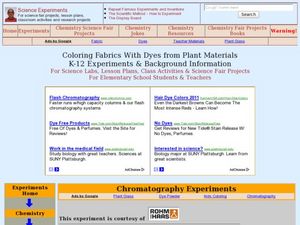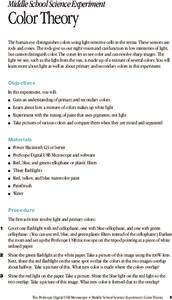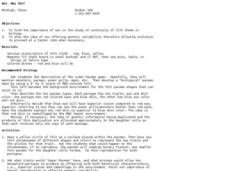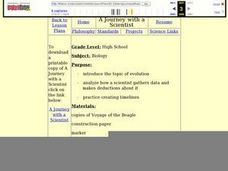Curated OER
Coloring Fabrics With Dyes from Plant Materials K-12 Experiments & Background Information
Students investigate the effects of acid and bases on dyes made with plant materials. For this chromatography lesson students predict color outcomes and complete a lab activity on color combinations.
Curated OER
Alternate Theory of Color Perception
Students use the color wheel, matches, masking tape, and slides to view an alternate theory of color perception. In this color perception lesson plan, students discuss the different theories and processors.
Curated OER
Color Theory
Students are able to gain an understanding of primary and secondary colors. They are able to explore about how a mixture of colors makes up white light. Students are able to experiment with the mixing of paint that uses pigments, not...
Curated OER
Spinners of Color
Students review primary, secondary, and intermediate colors. They use a worksheet to select the combination of colors they want to try on the spinners. They predict the outcome of the spinning colors.
Nuffield Foundation
Investigating How We See Colour
Can you eyes be fooled into seeing colors that aren't actually there? Budding scientists view a presentation that addresses this topic. They explore how their eyes interpret color through the retinas and messages sent to the brain. They...
Curated OER
Color Principles - Hue, Saturation, and Value
Students identify different color models and the application of the color theory. They create different visualizations that compare color models.
Virginia Department of Education
Acid-Base Theory
Litmus paper, why so blue? A chemistry lesson plan includes a pre-lab activity, practice calculating pH, an experiment measuring the pH in acids and bases, a titration demonstration, and a titration experiment.
Curated OER
A Model for Natural Selection- Spaghetti Worms
Does the early bird really get the worm? If so, which color of worm does it prefer? In an exciting and easy week-long field investigation, young field biologists set up a one square meter feeding area for birds. If you have a webcam,...
Curated OER
Understanding the Cosmic Microwave Background (CMB)
How did our universe really begin? Explore the Science Big Bang Theory and Cosmic Microwave Background (CMB) with this multiple activity-based instructional activity that demonstrates that the increase of density due to the decrease of...
Curated OER
Kinetic Theory
Young scholars describe how molecules of the different phases of matter move according to the Kinetic Theory. In this chemistry lesson, students observe and participate in teacher demos. They give real world applications of the kinetic...
Curated OER
Unit 3 Cell Structures: Cell Theory & Organelles
Students examine cell structures in depth. They decide what grade they want to work for and do the assignments for that grade. They complete various assignments on cell theory and organelles.
Curated OER
Look At Those Leaves
Students observe leaves. In this plant biology lesson plan, students examine leaves and classify them according to size, shape, and color. Students learn more about the leaves by visiting suggested websites.
Curated OER
THE MANY COLORS OF SUNLIGHT
Students examine rainbow components, spectral colors, colors perceived by the eye, hot solids, glowing rarefied gas, absorption, that light is a wave, and optics.
Curated OER
But, Why Sex?
Learners investigate the importance of sexual reproduction in evolution. In this sexual reproduction lesson plan, students simulate species with two traits: eye and skin color. They determine what characteristics are beneficial for the...
Curated OER
They're more evolved that way
Students explore the notion of local evolution, or genetic selectivity among different continent-based human populations. They consider specific examples of local evolution, such as lactose tolerance, skin color, and cognitive capacity,...
Curated OER
The Big Bang Theory
Learners explore the Big Bang Theory and discover how it can be used to explain the origin of the universe. For this Big Bang Theory lesson, students use a balloon with colored paper inside, blow it up and pop it, group the colored...
Curated OER
A Journey with a Scientist
Pupils work in groups as they read chapters of Charles Darwin's, Voyage of the Beagle. They take notes on the chapter and in their group make a timeline of the chapter. They tape the timelines together in order to depict the entire...
Curated OER
Natural Selection
Students comprehend that natural selectionis the tool for adaptation and evolution of populations. They pick three M&M's and no candy corns. Students tally the number of different color M&M's chosen. They discuss why colors...
Curated OER
Colors
Students learn about the Impressionist painters' use of color and how it connected to early nineteenth century scientific theories about color. For this colors lesson plan, students explore combinations of primary and secondary colors,...
Curated OER
Adaptation and Mimicry - Biology
Young scholars compare and contrast adaptations involving camouflage, warning coloration, and mimicry. They explain the relationship between adaptation and ability for survival and reproduction. Students define Batesian and Mullerian...
Curated OER
Cells & Their Function
Students review cell theory, identify major organelles found in typical cell, describe function of each major organelle, compare plant and animal cells, and demostrate understanding that cancer is caused by uncontrolled division of cells.
Curated OER
Mimicry: An Example of Adaptation
Learners are able to explain the relationship between adaptation and ability for survival and reproduction. They are able to give examples of a series of adaptations that would support the idea that evolution is a series of minor...
Curated OER
Evolution Lab
Students examine the pattern of natural variation in a society. They examine Darwin's theory of evolution and analyze data. They use computer programs to graphically display the variation in organisms.
Curated OER
The Chips Are Down: A Natural Selection Simulation
Students, in teams, use different colored paper chips to represent prey and a piece of fabric as the environment.
Other popular searches
- Kandinsky Color Theory
- Color Theory Projects
- 3 Color Theory
- Art Color Theory
- Additive Color Theory
- Quilting Color Theory
- Color Theory With Painting
- Josph Albers Color Theory
- Color Theory Lesson Plans
- Fall Autumn Color Theory
- Op Art Color Theory
- Color Theory K 1























